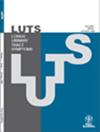Knowledge, Attitudes, and Practices of Physiotherapists Regarding the Management of Urinary Incontinence in Elderly Patients in France: A Cross-Sectional Study
Abstract
Context
Studies on nurses' and nursing assistants' perceptions of urinary incontinence (UI) in the elderly are well-documented; however, little to no research focuses specifically on physiotherapists. This study aims to explore physiotherapists' perspectives on UI among elderly patients.
Objectives
To assess the knowledge, attitudes, and practices of physiotherapists in France regarding managing UI in elderly patients, and to explore how training influences their confidence and clinical behaviors.
Methods
A cross-sectional online survey was conducted among physiotherapists practicing in France. The questionnaire addressed sociodemographic characteristics, experience with elderly patients with UI, and training in pelvic-perineal rehabilitation. Descriptive statistics and χ2 analyses were used to identify associations.
Results
A total of 106 responses were collected. Among respondents, 80 (75.5%) reported knowing UI in elderly patients, but 62 (58.5%) expressed feeling powerless when managing such cases. Only 62 (58.5%) reported having the skills to help patients with UI, and just 10 (9.4%) used validated assessment tools. Physiotherapists who had received prior training—whether through initial education, continuing education, or self-directed study—were significantly more likely to report confidence, satisfaction, and proper use of tools (p < 0.01). A majority, 75 (70.8%), indicated a need for further training, and 60 (56.6%) expressed the need for clinical guidelines.
Discussion
This study reveals a gap between physiotherapists' knowledge of UI and their ability to manage it confidently in elderly patients. Training was significantly associated with greater competence and use of recommended practices. The underuse of assessment tools and expressed need for clearer guidelines suggest structural gaps in support and education.
Conclusion
Improving UI training and access to standardized tools could enhance physiotherapists' confidence and quality of care. Although conducted in France, these findings may inform international strategies to address similar gaps in geriatric continence care.
MESH
Urinary Incontinence; Aged; Geriatric Assessment; Pelvic Floor; Physical Therapy Modalities; Health Knowledge, Attitudes, Practice; Surveys and Questionnaires; Education, Professional; Education, Continuing; Clinical Competence; France.


 求助内容:
求助内容: 应助结果提醒方式:
应助结果提醒方式:


